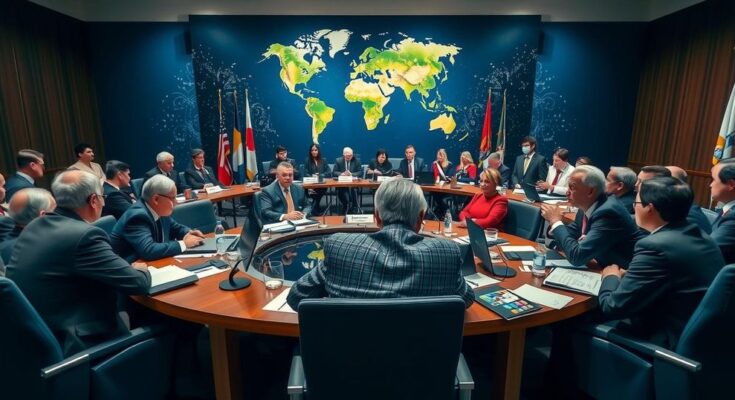Despite decades of international climate conferences, global temperatures have surpassed the critical threshold of 1.5°C, and fossil fuel production continues to rise. The commitments made, such as the recent pledge of $300 billion to help developing nations, are grossly inadequate compared to the funds allocated to fossil fuel subsidies. Immediate action is necessary, focusing on significant emissions cuts and accountability to avert catastrophic climate outcomes.
The climate crisis continues to worsen despite decades of international agreements and conferences aimed at addressing environmental issues. The landmark Earth Summit in Brazil in 1992 sparked a series of COP meetings intended to reduce greenhouse gas emissions and protect biodiversity. However, recent reports indicate a troubling trend: fossil fuel production is at its highest levels, and global temperatures have breached the critical threshold of 1.5°C. This failure is not solely due to outright climate deniers or the machinations of oil-producing nations.
While leaders like Donald Trump and various authoritarian figures resist change, the larger issue lies within governments and corporations that publicly commit to climate action, yet deliver inadequate results. The recent COP29 held is a case in point; despite pledging $300 billion annually to assist developing countries, this commitment falls short of the estimated $1.2 trillion needed annually to combat climate change effectively. Furthermore, it remains far less than the $620 billion these countries allocate to fossil fuel subsidies, which, if redirected to renewable energy, could substantiate a monumental shift towards sustainability.
The narrative around climate change often pits economic growth against ecological necessity, with executives promoting a misleading narrative that technological solutions can mitigate climate change effects in the future. However, the speculative nature of such technological fixes poses significant risks. The advent of a “net zero” target by 2050, while ambitious, allows governments and businesses to evade immediate action by postponing substantial emissions reductions. Experts recommend emphasizing short-term emission cuts as a genuine measure of accountability beyond these long-term pledges and establishing a framework for more transparent COP processes.
Pragmatic short-term measures could provide significant impact: addressing methane emissions, reallocating fossil fuel subsidies to renewable energy, and enhancing support for nuclear energy development. Moreover, the global community needs to hold politicians and corporate leaders accountable for their actions in the present rather than their future commitments. While the transition to a sustainable system is indeed happening, expediting these actions is crucial. A unified focus on cutting emissions is non-negotiable if humanity hopes to avert the catastrophic outcomes of climate inaction.
In conclusion, the urgency of the climate crisis compels both political and business leadership to prioritize meaningful action over symbolic commitments. It is imperative to allocate necessary financial resources, foster transparent discussions about the implications of climate actions, and establish real accountability to avert a future marred by environmental devastation. The true challenge lies in translating goodwill into actionable solutions without further delay.
The article addresses the ongoing failure to effectively combat climate change, despite numerous international agreements and conferences since the Earth Summit in 1992. It highlights the stark contrast between stated commitments from governments and businesses and their actual actions, notably in promoting fossil fuel production over renewable energy investments. By stressing the importance of immediate and concrete actions, the article seeks to illuminate the disparity between rhetoric and reality in climate policy, urging a shift in focus towards verifiable emissions reductions in the near term.
The climate crisis demands urgent action that goes beyond empty promises and long-term targets. Immediate and significant reductions in greenhouse gas emissions are essential to safeguard the planet and future generations. To address this pressing challenge, it is crucial that governments and business leaders are held accountable for their commitments and that substantial investments are made in sustainable practices. Only a concerted effort to serve economic interests alongside environmental priorities will yield the necessary outcomes to combat climate change effectively.
Original Source: bylinetimes.com




